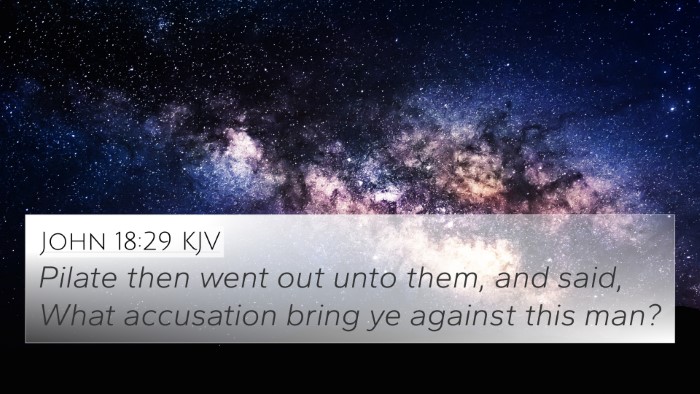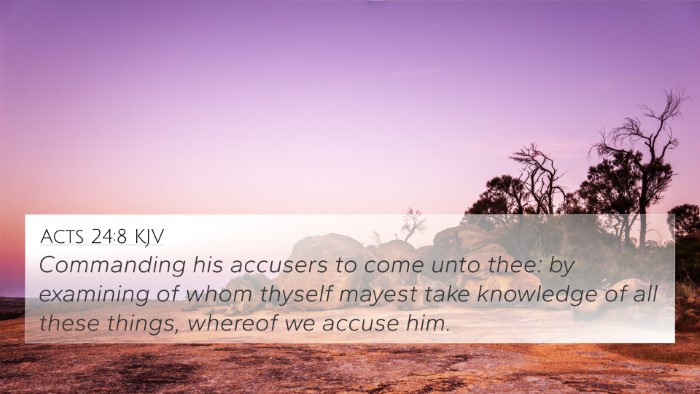Old Testament
Genesis Exodus Leviticus Numbers Deuteronomy Joshua Judges Ruth 1 Samuel 2 Samuel 1 Kings 2 Kings 1 Chronicles 2 Chronicles Ezra Nehemiah Esther Job Psalms Proverbs Ecclesiastes Song of Solomon Isaiah Jeremiah Lamentations Ezekiel Daniel Hosea Joel Amos Obadiah Jonah Micah Nahum Habakkuk Zephaniah Haggai Zechariah MalachiActs 25:5 Similar Verses
Acts 25:5 Cross References
Let them therefore, said he, which among you are able, go down with me, and accuse this man, if there be any wickedness in him.
Uncover the Rich Themes and Topics of This Bible Verse
Listed below are the Bible themes associated with Acts 25:5. We invite you to explore each theme to gain deeper insights into the Scriptures.
Acts 25:5 Cross Reference Verses
This section features a detailed cross-reference designed to enrich your understanding of the Scriptures. Below, you will find carefully selected verses that echo the themes and teachings related to Acts 25:5 KJV. Click on any image to explore detailed analyses of related Bible verses and uncover deeper theological insights.

1 Samuel 24:11 (KJV) »
Moreover, my father, see, yea, see the skirt of thy robe in my hand: for in that I cut off the skirt of thy robe, and killed thee not, know thou and see that there is neither evil nor transgression in mine hand, and I have not sinned against thee; yet thou huntest my soul to take it.

John 18:29 (KJV) »
Pilate then went out unto them, and said, What accusation bring ye against this man?

Acts 25:18 (KJV) »
Against whom when the accusers stood up, they brought none accusation of such things as I supposed:

Acts 18:14 (KJV) »
And when Paul was now about to open his mouth, Gallio said unto the Jews, If it were a matter of wrong or wicked lewdness, O ye Jews, reason would that I should bear with you:

Acts 25:16 (KJV) »
To whom I answered, It is not the manner of the Romans to deliver any man to die, before that he which is accused have the accusers face to face, and have licence to answer for himself concerning the crime laid against him.

Acts 24:8 (KJV) »
Commanding his accusers to come unto thee: by examining of whom thyself mayest take knowledge of all these things, whereof we accuse him.

Acts 23:30 (KJV) »
And when it was told me how that the Jews laid wait for the man, I sent straightway to thee, and gave commandment to his accusers also to say before thee what they had against him. Farewell.

Acts 25:25 (KJV) »
But when I found that he had committed nothing worthy of death, and that he himself hath appealed to Augustus, I have determined to send him.
Acts 25:5 Verse Analysis and Similar Verses
Understanding Acts 25:5
In Acts 25:5, the Apostle Paul faces a challenging moment in his ministry, as he is brought before Festus, the newly appointed governor. This verse serves as a pivotal point in illustrating themes of justice, the legal system, and divine sovereignty in the face of human authority.
Verse Context
To grasp the full meaning of Acts 25:5, it is essential to consider its surrounding context. In this chapter, Paul is under trial, accused by the Jewish leaders of various crimes. Paul appeals to his rights as a Roman citizen, navigating the complexities of the legal proceedings with wisdom and courage.
Verse Analysis
Acts 25:5 reads:
"Therefore, said Festus, Let them which among you are able, go down with me, and accuse this man, if there be any wickedness in him."
This statement reflects Festus's attempt to uphold justice while recognizing the rights of Paul as a Roman citizen.
Key Insights from Commentaries
- Matthew Henry: Henry emphasizes that Festus seeks to ensure a fair trial, urging those who have accusations to present them directly. This illustrates the importance of accountability within the judicial process.
- Albert Barnes: Barnes comments on the nature of the accusations and the political dynamics at play. He notes that Paul is portrayed as an innocent man amidst false accusations, highlighting God's providence in Paul's circumstance.
- Adam Clarke: Clarke explores the significance of Festus's invitation, pointing out it demonstrates both Paul’s rights and the Jewish leaders' responsibility to substantiate their claims. This serves as a reminder of the weight of evidence in legal matters.
Bible Cross-References
Acts 25:5 is interconnected with several other verses that enhance its understanding:
- Acts 22:25-29: Paul's defense of his Roman citizenship.
- Acts 24:16-18: Paul speaks of his conduct and the accusations against him.
- Romans 13:1-4: Submission to governing authorities as a matter of conscience.
- Luke 12:11-12: Jesus’ teaching about how to respond when brought before authorities.
- 1 Peter 2:13-17: Guidance on submitting to human institutions for the Lord's sake.
- John 18:31-32: The legal proceedings that Jesus faced, similar to Paul’s situation.
- Acts 26:1-3: Paul’s defense before Agrippa, further illustrating his consistent stand.
Thematic Connections
Acts 25:5 introduces several broader theological themes:
- Divine Justice: The verse confirms the biblical principle that God works through earthly authorities to uphold justice.
- Christian Conduct Under Persecution: Paul’s example teaches believers how to navigate legal challenges with integrity.
- The Role of Evidence: The importance placed on proof and testimony speaks volumes about the foundation of both spiritual and earthly justice.
Tools for Bible Cross-Referencing
To delve deeper into biblical connections and enhance one’s understanding of scriptures, various tools can be utilized:
- Bible Concordance: A comprehensive index that helps locate verses based on keywords, allowing for deeper study of thematic connections.
- Bible Cross-Reference Guide: Helps find related verses and themes quickly, facilitating comparative Bible verse analysis.
- Bible Chain References: A method of linking related scriptures together in a flowing chain, useful for thematic studies.
Conclusion
Acts 25:5 is more than just a historical account; it is a profound lesson on justice, accountability, and the sovereignty of God in all aspects of life, particularly in legal and societal systems. By understanding this verse, believers can gain insights into how to approach their own struggles within the frameworks of faith, law, and integrity.



